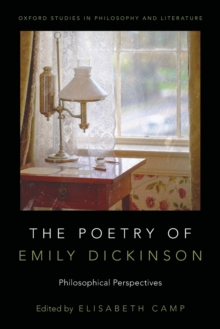Description
| Product ID: | 9780190651206 |
| Product Form: | Paperback / softback |
| Country of Manufacture: | US |
| Series: | Oxford Studies in Philosophy and Literature |
| Title: | The Poetry of Emily Dickinson |
| Subtitle: | Philosophical Perspectives |
| Authors: | Author: Elisabeth Camp |
| Page Count: | 224 |
| Subjects: | Philosophy of language, Philosophy of language, Literary theory, Literary studies: general, Literary studies: c 1800 to c 1900, Literary studies: poetry and poets, Philosophy, Philosophy: metaphysics and ontology, History of ideas, Literary theory, Literary studies: general, Literary studies: c 1800 to c 1900 , Literary studies: poetry & poets, Philosophy, Philosophy: metaphysics & ontology, History of ideas |
| Description: | This brings philosophers and literary theorists together in a sustained, coherent conversation about the philosophical status and implications of Emily Dickinson''s poetry. Written in an accessible, jargon-free way, the volume''s six chapters demonstrate that Plato''s famous quarrel between poetry and philosophy can in fact be a productive and enjoyable one, and that both modes of thought can make a practical difference in how we live and make sense of our everyday lives. One of America''s most celebrated poets, Emily Dickinson was virtually unpublished in her lifetime. When a slim volume of her poems emerged on the American scene in 1890, her work created shockwaves that have not subsided yet. Famously precise and sparse, Emily Dickinson''s poetry is often described as philosophical, both because her poetry grapples with philosophical topics like death, spirituality, and the darkening operations of the mind, and because she approaches those topics in a characteristically philosophical manner: analyzing and extrapolating from close observation, exploring alternatives, and connecting thoughts into cumulative demonstrations. But unlike Lucretius or Pope, she cannot be accused of producing versified treatises. Many of her poems are unsettling in their lack of conclusion; their disparate insights often stand in conflict; and her logic turns crucially on imagery, juxtaposition, assonance, slant rhyme, and punctuation. The six chapters of this volume collectively argue that Dickinson is an epistemically ambitious poet, who explores fundamental questions by advancing arguments that are designed to convince. Dickinson exemplifies abstract ideas in tangible form and habituates readers into productive trains of thought--she doesn''t just make philosophical claims, but demonstrates how poetry can make a distinct contribution to philosophy.All essays in this volume, drawn from both philosophers and literary theorists, serve as a counterpoint to recent critical work, which has emphasized Dickinson''s anguished uncertainty, her nonconventional style, and the unsettled status of her manuscripts. On the view that emerges here, knowing is like cleaning, mending, and lacemakingL a form of hard, ongoing work, but one for which poetry is a powerful, perhaps indispensable, tool. |
| Imprint Name: | Oxford University Press Inc |
| Publisher Name: | Oxford University Press Inc |
| Country of Publication: | GB |
| Publishing Date: | 2021-03-31 |
